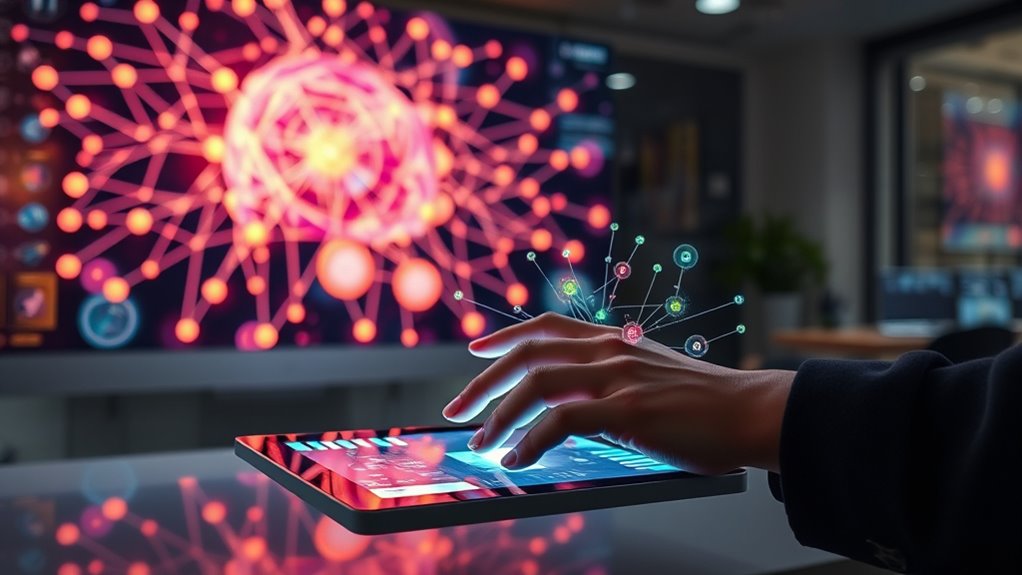AI-powered strengths mapping gives you a fresh perspective on your unique talents by analyzing various performance and behavioral data. It quickly identifies your skills, helps you find ideal roles, and boosts collaboration. While it offers powerful insights, it’s important to be aware of privacy, biases, and data quality. Using this technology responsibly enhances your development, and if you explore further, you’ll discover how to leverage it for meaningful growth.
Key Takeaways
- AI enhances talent identification by analyzing diverse data points for comprehensive individual profiles.
- It accelerates role assignment and collaboration, improving team dynamics and productivity.
- Ethical use requires transparency, privacy respect, and bias mitigation to ensure fair talent assessment.
- AI complements human judgment, with ongoing oversight needed to interpret nuanced qualities like creativity.
- Regular audits and feedback improve AI accuracy, fostering trust and aligning insights with organizational values.

In today’s competitive landscape, understanding your team’s strengths is more important than ever, and AI-powered strengths mapping makes this process faster and more accurate. By leveraging advanced algorithms, you can identify individual talents with a level of detail that manual assessments often miss. This technology analyzes a range of data points—performance metrics, behavioral patterns, and even communication styles—to create a thorough profile of each team member’s unique capabilities. The result is a clearer picture of how to assign roles, foster collaboration, and develop talent more effectively. Additionally, integrating insights from home theatre projectors and other multimedia tools can enhance engagement and training methods within organizations. However, it’s vital to recognize the ethical implications of deploying such tools. You need to guarantee that the data collected respects privacy rights and avoids bias. Without careful oversight, AI systems might reinforce existing stereotypes or unfairly categorize individuals, leading to potential discrimination. Transparency about what data is collected, how it’s used, and who has access is essential to maintain trust and uphold ethical standards. Additionally, technological limitations can impact the accuracy and fairness of strengths mapping. AI models depend heavily on the quality and breadth of data they’re trained on. If the data is incomplete or biased, the resulting insights may be flawed, which could mislead decision-making or overlook hidden talents. You should also be aware that AI algorithms have difficulty capturing nuanced human qualities like creativity, emotional intelligence, or adaptability—traits that don’t always manifest in quantifiable data. This means that AI-powered strengths mapping should complement, not replace, human judgment. It’s best used as a tool to enhance your understanding, not as the sole basis for critical personnel decisions. As the technology continues to evolve, so will its capabilities to interpret complex human attributes more accurately. Still, ongoing vigilance is necessary to guarantee that the insights generated align with your organization’s values and ethical standards. You must also be prepared to address any technological shortcomings proactively. Regular audits, ongoing training for AI systems, and feedback loops can help mitigate biases and improve accuracy over time. Ultimately, AI-powered strengths mapping offers a powerful new lens through which you can view your team’s talents. It enables faster, data-driven insights while highlighting the importance of ethical considerations and awareness of technological limitations. When used thoughtfully, this approach can reveal hidden potentials and foster a more dynamic, effective work environment—driving success while respecting individual dignity and fairness.
Frequently Asked Questions
How Accurate Is AI in Identifying Subtle Personal Strengths?
You wonder how accurate AI is at spotting subtle personal strengths. While AI can analyze patterns and provide insights, it’s not perfect. Subjectivity bias and contextual nuances can influence its accuracy, making it sometimes miss the deeper, nuanced qualities that define your strengths. Still, when combined with your self-awareness, AI offers valuable, data-driven perspectives that help you better understand your unique talents, even if it’s not 100% precise.
Can AI Detect Weaknesses or Only Strengths?
You might think AI only spots strengths, but it can also detect weaknesses through pattern analysis. While AI bias can influence results, it helps validate your areas for improvement alongside strengths validation. AI’s accuracy depends on data quality, so don’t rely solely on it. It provides valuable insights, but human judgment remains essential. Ultimately, AI offers a balanced view, highlighting both your talents and potential pitfalls effectively.
How Does AI Account for Cultural Differences in Strengths?
You might wonder how AI accounts for cultural differences in strengths. It considers cultural nuances by analyzing diverse data sources and adapting its algorithms accordingly. This helps mitigate bias and guarantees a more accurate reflection of individual talents across different backgrounds. By continuously learning and updating, AI recognizes that strengths vary culturally, providing personalized insights that respect and incorporate these unique perspectives.
Is Ai-Powered Mapping Suitable for All Industries?
Think of AI-powered mapping as a versatile tool, like a Swiss Army knife, adaptable to many industries. It’s suitable for healthcare, finance, education, and more, thanks to industry-specific applications and AI customization options. While some sectors may need tailored features, most businesses can harness this technology to identify talents and strengths. Just make certain the system’s settings align with your industry’s unique needs for the best results.
How Secure Is My Personal Data During AI Analysis?
You might worry about your personal data’s security during AI analysis, and that’s understandable. Rest assured, reputable AI platforms prioritize privacy concerns by using robust data encryption methods to protect your information. They limit access to your data and often anonymize it, ensuring your details stay confidential. Before sharing, review the platform’s privacy policies and security features to feel confident your data remains safe throughout the process.
Conclusion
Embracing AI-powered strengths mapping puts you ahead of the curve, giving you a clear view of your unique talents. It’s like having a compass that guides your growth and success. Remember, the early bird catches the worm, so don’t wait to tap into this powerful tool. By understanding your strengths, you’re better equipped to navigate challenges and seize opportunities—turning your potential into real achievement. The future’s brighter when you play to your strengths.









